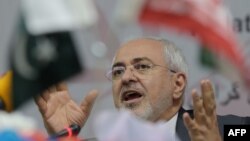Iran Tuesday disclosed that it and Pakistan had foiled two suicide attacks on Iran's territory by militants based in Pakistan.
Iranian Foreign Minister Mohammad Javad Zarif made the revelation during an official visit to Islamabad, saying the attacks had been planned for this past Monday.
Tehran has long alleged that anti-Iranian Sunni extremists use hideouts in the Pakistani border province of Baluchistan for plotting terrorism against Iran, a country of mostly Shi'ite Muslims.
Jaish al-Adl, or the Army of Justice, has claimed responsibility for the majority of recent attacks on Iranian soil.
“Last night, unfortunately, we had two suicide [bombing] attempts from Pakistani territory into Iran. Both of them were foiled and we had excellent cooperation from the Pakistani armed forces in order to contain this,” noted Zarif, while speaking to Pakistan's private Geo News channel.
He did not give further details or identify the attacks’ planners.
The television station aired excerpts of Zarif's interview ahead of its scheduled broadcast Tuesday night.
Twenty percent of Pakistan's 207 million predominantly Sunni Muslim population are Shi'ite.
Traditionally deep cultural, economic and religious bilateral relations have come under pressure in recent years in the wake of an increase in deadly cross-border attacks, particularly in poverty-stricken Iranian Sistan-Baluchistan province, next to the Pakistani border.
The southeastern Iranian region of predominantly Sunni Muslims has long been plagued by drug smuggling gangs and separatists.
Last year, militants ambushed and killed 10 Iranian border guards and allegedly took another back to hideouts in the sparsely populated Pakistani province of Baluchistan.
The incident fueled bilateral tensions and Iranian authorities threatened to conduct cross-border raids to rescue the hostage and punish the assailants if Islamabad failed to do so.
Zarif said the Iranian border guard taken hostage has not been freed and that, “We hope that our Pakistani friends help us return him.”
Since then, the Iranian minister said, there has been “excellent cooperation” between the two countries and Monday’s incident “was an indication.”
Iran shares more than 900 kilometers of largely porous border with Pakistan. Both countries have lately beefed up security on their respective sides.
The Pakistani military has recently deployed about 12,000 troops and established new outposts along the frontier, while the Iranians are building a fence on their side.
Iranian Foreign Minister Zarif, in discussions with Pakistani civilian and military leaders, emphasized the need for enhancing security cooperation against terrorism.
Tehran is concerned about the emergence of Islamic State in neighboring Afghanistan, where years of war and deteriorating security have encouraged IS militants to establish bases and sanctuaries in “ungoverned” areas.
The “presence of Daesh in this region is a threat to all of us. Unfortunately, Daesh was defeated territorially in Iraq but the ideology was not defeated, the network was not defeated,” Zarif said Monday, while delivering a public talk in Islamabad. He was using the Arabic acronym for IS.
The Iranian diplomat again accused the U.S. military of helping the Afghan branch of IS to establish a foothold in the war-ravaged country.
Washington rejects the charges as “mere rumors” and cites its sustained counterterrorism operations in partnership with Afghan forces against IS bases that it says have significantly degraded the group and reduced the number of its fighters.
